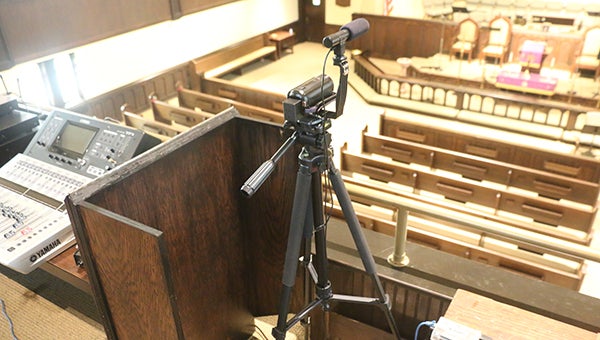Local churches had to adapt quickly during pandemic
Published 8:00 am Sunday, March 28, 2021

- A view from the videographer’s seat at Crawford Street United Methodist Church. (Terri Cowart Frazier/The Vicksburg Post)
In times of crisis, it is our spiritual community that often helps guide us through tough times.
But when the country was forced to shut down due to the pandemic, this meant doors closed for many houses of worship.
Pastors, priests and Rabbis were left trying to figure out how they could continue to minister to their members — especially during a time when prayers of healing and words of hope were most needed.
While many of the churches in Vicksburg decided to close their doors with intentions of keeping their members safe from the virus, finding ways to stay connected became imperative, and social media became the lifeline for the church.
“Immediately following the shutdown last year and uncertain when we might gather for in-person worship again, several of our members worked diligently together, creating a podcast of our worship services to reach our membership and followers,” First Presbyterian Church Pastor Tim Brown said.
This went well and “Members tuned in to listen,” he said.
To reach its members, Crawford Street United Methodist Church began live-streaming worship services with only a handful allowed to participate — namely church staff and whoever was asked to offer the musical message.
In expressing his views about virtual services, CSUMC Minister Kevin Bradly said, “The two words that come to mind are adaptability and flexibility. We have all had to learn to adapt to church and church-related activities and become quite flexible.” Oftentimes, he said, “modifying previously planned services sometimes occurring hours before the actual service.”
Pastor R. D. Bernard said for the last decade King Solomon has had both radio and TV broadcasts.
“But during the pandemic, the church also added a private Facebook community for its members,” he said.
All three ministers confess that while social media has offered members the opportunity to stay somewhat in touch with their respective church, the ability to gather as the body of Christ has been missed.
So when the initial lockdown and then again after the spike in cases during the holidays began to slow, the churches began to open their doors again, but only after safety measures had been put in place.
“Early in the pandemic, we created the Crawford Street Pandemic Leadership Team, which has been instrumental in the decision-making process related to in-person gatherings,” Bradley said. “All of our decisions have been made mindful of the admonition of Jesus to love one another. As United Methodist, we are also mindful of John Wesley’s instruction to do no harm.”
King Solomon also has a COVID advisory committee, Bernard said.
“The committee establishes policies and procedures for all aspects of church life during the pandemic, and it is also responsible for educating the Church body through weekly church-wide emails regarding COVID,” he said.
Safety protocols for all the churches include gloves, hand sanitizer, masks, temperature checks, social distancing and facility sanitation.
Looking toward the future, one can only surmise how the overall impact of the pandemic will affect churches moving forward.
Bernard wonders if members will have become accustomed to services offered over social media.
“There seems to be much more of mixing between the sacred and secular — since many have been away from the sacred space of the sanctuary and the altar. I fear that Sunday is fast becoming the new Saturday. Electronic (virtual) services are much shorter and are viewed on many of the same devices that full-length movies are viewed,” he said. “I believe that COVID, when studied years from now by church historians, will prove to be the spiritual ‘Hurricane Katrina’ of our lifetimes.”
While COVID has created challenges, Bernard, along with Brown and Bradley, acknowledged the pandemic has underscored the importance of the church.
“COVID has forced faith communities to learn more, in caring ways, about the needs of individual families within the church. This experience has brought our church family closer,” Bernard said. “We now have more home and in many cases ‘yard’ visitations than we have ever had. This has allowed us to learn and serve our members in a new and vibrant way.”
“In the midst of this terrible pandemic,” Bradley said. “God reminded us all of what it means to be the church. We have realized the importance of community and connection that comes with being together with our sisters and brothers in the faith. Because of this, we have all embraced the new and necessary ways of doing things so that we can be connected with our church community. I truly think that as we reach the end of this pandemic, all of the churches will emerge with a sense of renewal and revival.”
“Anytime there is a crisis, one of the greatest comforts Christians claim, has always been our ability to gather in thanksgiving, praise, worship and fellowship with God and with one another. COVID has uniquely prevented us from doing just that,” Brown said. “Today’s technology has at least enabled us to reach one another in alternative ways. Our podcast has served as a wonderful tool to temporarily allow those who can’t attend in person the opportunity to worship together virtually. Zoom has enabled us to meet in smaller groups. However, if we’ve learned anything, as much as we’re thankful for today’s technology, it cannot replace in-person worship, discipleship, or fellowship. We are just better when we are together.”






